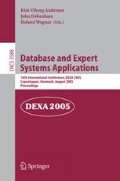Abstract
Database integrity constraints, understood as logical conditions that must hold for any database state, are not fully supported by current database technology. It is typically up to the database designer and application programmer to enforce integrity via triggers or tests at the application level, which are difficult to maintain and error prone. Two important aspects must be taken care of. 1. It is too time consuming to check integrity constraints from scratch after each update, so simplified checks before each update should be used relying on the assumption that the current state is consistent. 2. In concurrent database systems, besides the traditional correctness criterion, the execution schedule must ensure that the different transactions can overlap in time without destroying the consistency requirements tested by other, concurrent transactions. We show in this paper how to apply a method for incremental integrity checking to automatically extend update transactions with locks and simplified consistency tests on the locked elements. All schedules produced in this way are conflict serializable and preserve consistency in an optimized way.
Access this chapter
Tax calculation will be finalised at checkout
Purchases are for personal use only
Preview
Unable to display preview. Download preview PDF.
References
Ceri, S., Widom, J.: Deriving production rules for constraint maintainance. In: McLeod, D., Sacks-Davis, R., Schek, H.-J. (eds.) 16th International Conference on Very Large Data Bases, pp. 566–577. Morgan Kaufmann, San Francisco (1990)
Chakravarthy, U.S., Grant, J., Minker, J.: Foundations of semantic query optimization for deductive databases. In: Foundations of Deductive Databases and Logic Programming, pp. 243–273. Morgan Kaufmann, San Francisco (1988)
Christiansen, H., Martinenghi, D.: Simplification of database integrity constraints revisited: A transformational approach. In: Bruynooghe, M. (ed.) LOPSTR 2004. LNCS, vol. 3018, pp. 178–197. Springer, Heidelberg (2004)
Decker, H.: Translating advanced integrity checking technology to SQL. In: Database integrity: challenges and solutions, pp. 203–249. Idea Group Publishing, USA (2002)
Decker, H., Celma, M.: A slick procedure for integrity checking in deductive databases. In: Van Hentenryck, P. (ed.) ICLP 1994, pp. 456–469. MIT Press, Cambridge (1994)
Garcia-Molina, H., Ullman, J.D., Widom, J.: Database Systems. The complete book. Prentice-Hall, Englewood Cliffs (2002)
Godfrey, P., Grant, J., Gryz, J., Minker, J.: Integrity constraints: Semantics and applications. In: Logics for Databases and Information Systems, pp. 265–306. Kluwer, Dordrecht (1998)
Grant, J., Minker, J.: Integrity constraints in knowledge based systems. In: Adeli, H. (ed.) Knowl. Eng. Applications, vol. II, pp. 1–25. McGraw-Hill, New York (1990)
Gupta, A., Mumick, I.S. (eds.): Materialized Views. Techniques, Implementations, and Applications. MIT Press, Cambridge (1999)
Henschen, L., McCune, W., Naqvi, S.: Compiling constraint-checking programs from first-order formulas. In: Gallaire, H., Minker, J., Nicolas, J.-M. (eds.) ADT 1988, vol. 2, pp. 145–169. Plenum Press, New York (1984)
Lloyd, J.W., Sonenberg, L., Topor, R.W.: Integrity constraint checking in stratified databases. JLP 4(4), 331–343 (1987)
Martinenghi, D.: Optimal database locks for efficient integrity checking. In: Benczúr, A.A., Demetrovics, J., Gottlob, G. (eds.) ADBIS 2004. LNCS, vol. 3255, pp. 64–77. Springer, Heidelberg (2004)
Martinenghi, D.: A simplification procedure for integrity constraints (2004), http://www.dat.ruc.dk/~dm/spic/index.html
Nicolas, J.-M.: Logic for improving integrity checking in relational data bases. Acta Informatica 18, 227–253 (1982)
Nilsson, U., Małuzyński, J.: Logic, Programming and Prolog, 2nd edn. John Wiley & Sons Ltd., Chichester (1995)
Salem, K., Garcia-Molina, H., Shands, J.: Altruistic locking. ACM Trans. Database Syst. 19(1), 117–165 (1994)
Seljée, R., de Swart, H.C.M.: Three types of redundancy in integrity checking: An optimal solution. Data & Knowledge Engineering 30(2), 135–151 (1999)
Author information
Authors and Affiliations
Editor information
Editors and Affiliations
Rights and permissions
Copyright information
© 2005 Springer-Verlag Berlin Heidelberg
About this paper
Cite this paper
Martinenghi, D., Christiansen, H. (2005). Transaction Management with Integrity Checking. In: Andersen, K.V., Debenham, J., Wagner, R. (eds) Database and Expert Systems Applications. DEXA 2005. Lecture Notes in Computer Science, vol 3588. Springer, Berlin, Heidelberg. https://doi.org/10.1007/11546924_59
Download citation
DOI: https://doi.org/10.1007/11546924_59
Publisher Name: Springer, Berlin, Heidelberg
Print ISBN: 978-3-540-28566-3
Online ISBN: 978-3-540-31729-6
eBook Packages: Computer ScienceComputer Science (R0)

